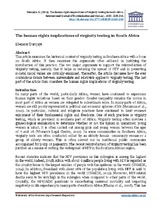| dc.contributor.author | Durojaye, Ebenezer | |
| dc.date.accessioned | 2018-09-10T11:49:50Z | |
| dc.date.available | 2018-09-10T11:49:50Z | |
| dc.date.issued | 2016 | |
| dc.identifier.citation | Durojaye, E. (2016). The human rights implications of virginity testing in South Africa. International Journal of Discrimination and the Law, 16(4): 228–246. | en_US |
| dc.identifier.issn | 1358-2291 | |
| dc.identifier.uri | http://dx.doi.org/10.1177/1358229116641242 | |
| dc.identifier.uri | http://hdl.handle.net/10566/4034 | |
| dc.description.abstract | This article examines the historical context of virginity testing in Southern Africa with a focus on South Africa. It then examines the arguments often adduced in justifying the introduction of this practice. The two major arguments to support the reintroduction of virginity testing, namely, that it helps in reducing the spread of HIV and in preserving societal moral values are critically examined. Thereafter, the article discusses how the ever contentious debate between universalists and relativists applies to virginity testing. The last part of the article then considers the human rights implications of virginity testing. | en_US |
| dc.language.iso | en | en_US |
| dc.publisher | SAGE Publications | en_US |
| dc.rights | This is the author-version of the article published online at: http://dx.doi.org/10.1177/1358229116641242 | |
| dc.subject | Virginity testing | en_US |
| dc.subject | South Africa | en_US |
| dc.subject | Human rights | en_US |
| dc.subject | Universalists and relativists | en_US |
| dc.title | The human rights implications of virginity testing in South Africa | en_US |
| dc.type | Article | en_US |
| dc.privacy.showsubmitter | FALSE | |
| dc.status.ispeerreviewed | TRUE | |

